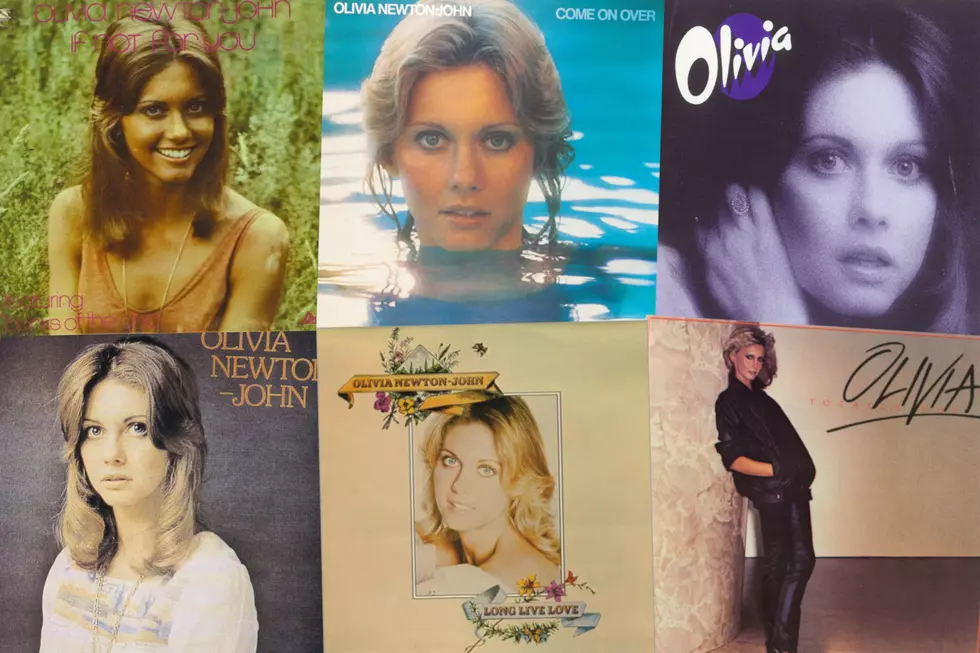
Olivia Newton-John’s 10 Best Classic Rock Covers
Olivia Newton-John may be remembered for her starring role in Grease or her chart-topping pop hits, but there was much more to the singer and actress.
Newton-John, who died Aug. 8 at the age of 73, began her musical career as a teenager, appearing on local television shows in Australia, where her family had immigrated from England when she was six.
In 1971, Newton-John released her debut album -- the first of 26 studio albums she'd release in her career. From day-one, the singer displayed a comfort with other artist's work, regularly recording a releasing covers amongst her own original material. Below, we've assembled Olivia Newton John's 10 Best Classic Rock Covers.
'The Long and Winding Road'
Newton-John delivers a flawless, breathy delivery of this Beatles classic, released on her 1976 album Come on Over. Though the arrangement is largely the same as the Fab Four’s original, Newton-John adds her own style of vulnerability and pop sensibility to the tune. Paul McCartney famously penned “The Long and Winding Road” while reflecting on the issues which would eventually break up the Beatles. In Newton-John’s hand’s, the track takes on a different vibe, more reflective of a romantic relationship falling apart.
'Me and Bobby McGee'
The opening song to Newton-John’s debut album is this upbeat version of “Me and Bobby McGee.” The track, penned by Kris Kristofferson and made famous by Janis Joplin, gets a faster tempo in the hands of Newton-John. As is so often the case with her covers, Newton-John injects a sweetness to the tune, giving it a positive feeling despite the lyrics’ inherent sadness.
'Why Don't You Write Me'
For her sophomore album, 1972’s Olivia, Newton-John covered several notable rockers. Among them, Simon & Garfunkel, who had originally released “Why Don’t You Write Me” on their beloved 1970 LP Bridge Over Troubled Water. It’s one of the more upbeat tracks from the duo’s LP, bouncing along to a breezy, reggae-influenced rhythm. Newton-John puts her own spin on the tune by adding a slightly country twang, including honky-tonk piano in the instrumentation.
'God Only Knows'
With its wonderful harmonies, poignant lyrics and distinctive Baroque-pop arrangement, “God Only Knows” is one of the most celebrated songs ever recorded. The track, penned by Brian Wilson and released on the Beach Boys seminal 1966 LP Pet Sounds, has been covered by a wide array of artists over the years. Newton-John released her version in 1974 on her fourth studio album, Long Live Love. In order to faithfully honor the Beach Boys’ harmonies, the singer layered her vocal parts, impressively recreating the song’s distinctive sounds.
'What Is Life'
George Harrison’s Top 10 hit “What Is Life” was one of the many highlights from the 1970 classic All Things Must Pass. Newton-John’s version is poppier, performed in a slightly different key and lacking the rockier edges to Harrison’s original. Still, the track fits her like a glove, as the uplifting tune and its romantic lyrics align with the singer’s wholesome demeanor. Newton-John obviously thought highly of the quiet Beatle -- so much that "What Is Life" was not the only Harrison cover featured on her 1972 LP Olivia.
'Behind That Locked Door'
“Behind That Locked Door” would be the second Harrison cover included on Olivia. The former Beatle leaned into country compositions with the original, a style Newton-John embraced even further on her rendition. The singer’s cover features strings, acoustic guitar and emotive vocal harmonies.
'If Not for You'
Newton-John’s first hit in America was this rendition of Bob Dylan’s “If Not For You.” Besides the obvious differences in vocal style, Newton-John’s version notably deviates from the original’s arrangement, removing the song’s harmonica part and instead depending on slide guitar. Newton-John clearly thought highly of the track, opting to name her debut album If Not for You. Her rendition reached No. 1 on the Hot AC chart, and peaked at No. 25 on the Billboard Hot 100. The version below comes from a 1971 TV appearance.
'Come on Over'
There were plenty of similarities between the Bee Gees and Newton-John. The Gibb brothers, like Newton-John, were born in England, but relocated to Australia at a young age. Both acts would later start their journey to fame Down Under, embraced by Australian audiences before invading the rest of the world. And both artists enjoyed experimenting with different genres. While the Bee Gees will always be connected with their disco heights, the band's catalog is littered with quality rock tunes. Among them, “Come On Over,” a ballad from their 1975 album Main Course. Released as the title track to Newton-John’s seventh studio album, her rendition peaked at No. 23 on the Billboard Hot 100. The Bee Gees and Newton-John would remain close friends over the years. The band famously scored a hit with “Grease” the titular song to the 1978 film which Newton-John starred in. The singer/actress was also known to regularly collaborate with Barry Gibb, joining him on stage on numerous occasions.
'Gimme Some Lovin''
For the 1978 album Totally Hot -- her first release since the huge success of Grease -- Newton-John enlisted a who’s-who of session musicians. Among them, Toto members Steve Lukather and David Hungate, both of whom played on this cover of the Spencer Davis Group’s “Gimme Some Lovin’.” The rendition is undeniably fun, with Newton-John clearly embracing the excitement surrounding her career at the time. Lukather would play on many of the singer’s biggest hits, including “A Little More Love” and “Physical.”
'If You Could Read My Mind'
Canadian singer-songwriter Gordon Lightfoot scored his first Canadian No. 1 in 1970 with “If You Could Read My Mind.” The song would peak at No. 5 in the U.S., building Lightfoot’s notoriety in America. Newton-John released her version of “If You Could Read My Mind” on her debut album, delivering the tune in country-pop fashion. “If You Could Read My Mind" would find itself at the center of controversy in 1987 when Lightfoot sued the composer of Whitney Houston's hit "The Greatest Love of All,” alleging plagiarism over some strikingly similar segments of the songs. The case was eventually settled out of court.



